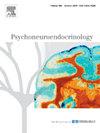睾酮和皮质醇共同调节青少年早期信任行为
IF 3.6
2区 医学
Q2 ENDOCRINOLOGY & METABOLISM
引用次数: 0
摘要
在青春期早期,个体在神经内分泌系统、神经发育和社会敏感性方面经历了显著的变化。对青少年来说,信任适当的人变得尤为重要,因为在这一时期,他们的同伴互动增加,对同伴影响的敏感性增加。青少年在做信任决定时会考虑到社会距离。然而,对不同社会距离的同伴所涉及的信任决策的生物学和认知机制尚不清楚。本研究调查了142名青少年(45 %女性,年龄= 12.32岁,年龄= 0.60)的信任决策背后的激素(基础皮质醇和基础睾酮)、认知(冲动和心理理论)和情境(朋友和陌生同伴)因素之间的相互作用。通过气球模拟风险任务、卡通故事推理任务和改进版本的信任游戏,我们分别评估了青少年的冲动性、心理理论以及对朋友和陌生人的信任投资和回报可能性的评估。尽管青少年在信任投资和信任评价中都表现出信任朋友多于陌生人的偏好,但研究结果表明,信任投资具有独特的激素-认知-情境机制。皮质醇主要通过冲动性直接和间接影响青少年的一般信任。睾酮似乎通过冲动性调节皮质醇对一般信任的间接影响,并通过心理理论影响其战略信任决策。这些发现突出了皮质醇和睾酮在信任及其潜在认知过程中的作用,并为促进健康社会发展的量身定制干预提供了指导。本文章由计算机程序翻译,如有差异,请以英文原文为准。
Testosterone and cortisol jointly mediate and modulate trust behavior in early adolescence
During early adolescence, individuals undergo significant changes in neuroendocrine systems, neurodevelopment, and social sensitivity. Placing trust in the appropriate person becomes especially crucial for adolescents, given their increased peer interaction and heightened susceptibility to peer influence during this period. Adolescents take social distance into account when making trust decisions. However, the biological and cognitive mechanisms involved in trust decision-making towards peers of different social distances remain unclear. The present study investigated the interactions among hormonal (basal cortisol and basal testosterone), cognitive (impulsivity and theory of mind), and contextual (friends and strange peers) factors underlying trust decision-making in a sample of 142 adolescents (45 % females, Mage = 12.32 years, SDage = 0.60). Using a balloon analog risk task, a cartoon story reasoning task, and a modified version of the trust game, we assessed adolescents’ impulsivity, theory of mind, as well as trust investment and evaluation of return possibility towards their friends and strangers, separately. The results showed a unique hormonal-cognitive-contextual mechanism underlying trust investment, despite adolescents demonstrating a preference for trusting friends over strangers in both trust investment and trust evaluation. Cortisol predominantly influenced adolescents’ general trust, directly and indirectly through impulsivity. Testosterone appeared to modulate the indirect effect of cortisol via impulsivity on general trust and impacted their strategic trust decisions through the theory of mind. These findings highlight the role of cortisol and testosterone in trust and its potential cognitive process and provide guidance for tailored interventions for promoting healthy social development.
求助全文
通过发布文献求助,成功后即可免费获取论文全文。
去求助
来源期刊

Psychoneuroendocrinology
医学-精神病学
CiteScore
7.40
自引率
8.10%
发文量
268
审稿时长
66 days
期刊介绍:
Psychoneuroendocrinology publishes papers dealing with the interrelated disciplines of psychology, neurobiology, endocrinology, immunology, neurology, and psychiatry, with an emphasis on multidisciplinary studies aiming at integrating these disciplines in terms of either basic research or clinical implications. One of the main goals is to understand how a variety of psychobiological factors interact in the expression of the stress response as it relates to the development and/or maintenance of neuropsychiatric illnesses.
 求助内容:
求助内容: 应助结果提醒方式:
应助结果提醒方式:


